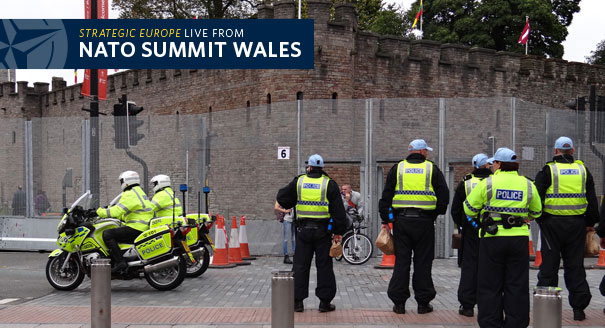It has been billed as historic. That’s the message NATO’s top brass is conveying to the world’s media during the alliance’s two-day summit that opened on September 4 on the grounds of a huge golf course and hotel complex in South Wales.
With the Ukraine crisis dominating the agenda, outgoing Secretary General Anders Fogh Rasmussen will push as far as he can to get a commitment from all 28 NATO member states to raise defense spending to 2 percent of their GDP. That is part of a longer-term strategy aimed at equipping NATO to protect its allies against the threats the alliance faces in its Eastern and Southern neighborhoods.
That’s all very well—and necessary, given Russia’s invasion of eastern Ukraine, Moscow’s annexation of Crimea, and the rise of the Islamic State in the Middle East.
That is why NATO needs to explain to the public what it stands for and why defense matters. But the alliance isn’t doing any kind of sustained outreach.
“I haven’t a clue what NATO is or what this summit is about,” said Lilly, a nineteen-year-old student. She has a part-time job as a waitress in a restaurant close to the majestic Cardiff Castle. That means she has a bird’s-eye view not just of all the NATO members’ flags but also of the long steel wire fence around the castle’s perimeter and of the hundreds of police officers on duty. “I don’t know whom the police are protecting. We’re told nothing really.”
Police officers did brief communities living close to the conference center, residents said.
But Sam, a fifty-six-year-old company director specializing in energy exploration, said it was time that NATO itself began to communicate to the public what it stood for.
“Look, I’ve seen NATO in action in Afghanistan, where I was doing geological surveys. So I know something about it,” he explained. “But what really gets me is that NATO officials never bothered to explain to the ordinary public about the summit itself,” he added.
“That’s the problem,” said a hotel manager doing his best to keep relaxed. “At the last minute, we were told to close even an auxiliary car park facility for our guests, for security reasons. I can understand that. What I don’t understand is that NATO had the chance to hold town-hall meetings with the citizens of Cardiff, but we hotel people weren’t briefed.”
Reaching out to the public is going to become even more important for NATO in the coming weeks and months. As the alliance starts to beef up its defenses, NATO needs to engage in dialogue with the public to explain why security matters.
Photo by Jon Candy, used under CC BY-SA / Cropped from original








